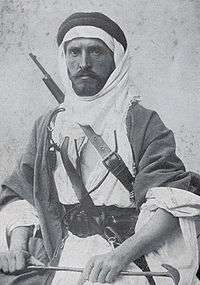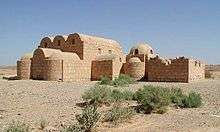Alois Musil

Alois Musil (30 June 1868, Rychtářov, now part of Vyškov, Moravia, Austria-Hungary – 12 April 1944, Otryby, Protectorate of Bohemia and Moravia) was a Czech theologist, orientalist, explorer and writer.
Biography
Musil was the oldest son born into the family of a farmer. He was a second cousin of Robert Musil, an Austrian writer.[1] In the years 1887–1891 he studied Roman Catholic theology at the University of Olomouc, was consecrated as a priest in 1891 and received a doctorate in theology in 1895. In the years 1895–1898 he studied at the Dominican Biblical School in Jerusalem, in 1897-1898 at the Jesuit University of St. Joseph in Beirut, 1899 in London, Cambridge and Berlin.

He traveled extensively throughout the Arab world and kept coming back to it until 1917, collecting a huge body of scientific material. Among his discoveries was the desert castle of Qasr Amra (from the 8th century) with figural Islamic paintings. In the process of trying to steal the now-famed Umayyad fresco Painting of the Six Kings from Qasr Amra, he permanently damaged the painting.[2] He later developed a serious lung disease.
Between his trips Musil continued working on his publications and lecturing. In 1902 he became professor of theology at the University of Olomouc, and in 1909, professor of Biblical studies and Arabic at Vienna University. In addition to modern and classical languages, he mastered 35 dialects of Arabic. He was so well acquainted with the Rwala-Beduins that he was accepted into the tribe as "Sheich Musa".
During World War I he was sent to the Middle East to eliminate British attempts to instigate a revolution against the Ottoman Empire, thus being an opponent of T. E. Lawrence. After the war he became a professor at Charles University in Prague (1920), despite opposing voices resenting his close ties with the House of Habsburg. He helped to establish the Oriental Institute of the Academy of Sciences in Prague (Orientální ústav Akademie Věd, in 1927).
In 1917 he journeyed through the Middle East with Archduke Hubert Salvator of Austria; there are suggestions that the mission had a political motive involving Arab Revolt against the Ottoman government.[3]
In cooperation with the American industrialist Charles Richard Crane he published his works in English (1922–23). In addition to scientific work and popular travel books he published 21 novels for young readers.
Musil worked for Charles University until 1938, but was active until the very end of his life. He died due to kidney dysfunction complicated by lung disease.
Works
- Kuseir 'Amra und andere Schlösser östlich von Moab, Wien 1902
- Sieben samaritanische Inschriften aus Damaskus, Wien 1903
- Od stvoření do potopy (From Creation to the Floo), Prag 1905
- Auf den Spuren der Geschichte des Alten Testaments, 2 Bde., Olmütz 1906/07
- Kuseir 'Amra, 2 Bde., Wien 1907
- Arabia Petraea, 4 Bde., Wien 1907/08
- Ethnologischer Reisebericht, Wien 1908
- Im nördlichen Hegaz, Wien 1911
- Zur Zeitgeschichte von Arabien, Leipzig 1918[4]
- The Manners and Customs of the Rwala Bedouins, 1928
- In the Arabian Desert, arranged for publication by Katherine McGiffort, New York 1930
- Krest'anské Církve dnešního orienta (The Christian Churches in the present day Orient), Olmütz 1939
- 1910 until 1933 over 1.500 articles, contributions to collected essays, and new paper articles, the most important ones are collected in: Dnešní Orient, 11 Bde., Prag 1934–1941.
Note
- His image appears on a 21Kc Czech Republic postage stamp
See also
References
- ↑ .
- ↑ Fowden, Garth (20 September 2004). Qusayr 'Amra: Art and the Umayyad Elite in Late Antique Syria. University of California Press. p. 198. ISBN 978-0-520-92960-9.
- ↑ "From Moravia to Arabia". Archived from the original on 2013-12-02. Retrieved 26 November 2013.
- ↑ Original publication of 1918
External links
- Detailed biography of Musil
- English article on Radio Prague
- Biography, bibliography (in Czech)
- Academic Society of Alois Musil (in Czech)
- Details of Musil's discoveries (in Czech)